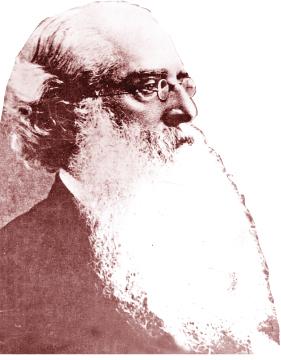
Colonel Olcott was an inspiring servant of mankind. He lived in our age and dedicated the later years of his life to Buddhism and the peoples of Asia, particularly, those of India and Sri Lanka. He gave up an affluent life for a simpler and nobler one. He devoted his energies to working for the benefit of the common people. The services rendered to Asia, and particularly, to the revival of Buddhist cultures are contributions worthy of an honoured place in the pages of Asian history.
Colonel Henry Steele Olcott was born on August 2, 1832, in New Jersey, U.S.A. After a brilliant school career at City College, New York and Colombia University, he became interested in agriculture. He edited a farmers’ periodical, and in 1858 became associated with the New York Tribune as agriculture editor. When the American Civil War broke out in 1861, he gave up his newspaper work and went to the front, where he eventually attained the rank of Colonel. Colonel Olcott served in special capacities in both, the Army and Navy Departments.
After the conclusion of the war, he was admitted to the Bar of New York State, and became a prominent Lawyer.
When he was employed by the “New York Sun” to investigate the mystic phenomena which took place at the Eddy Farm in New York, he met Madame Blavatsky and began a long friendship and collaboration with her which lasted until her death in 1891. During this time Colonel Olcott became interested in oriental religions, especially Buddhism. In 1875, he and Madame Blavatsky founded the Theosophical Society of New York.
He set out for India in 1878 to study various religions, and arrived in Sri Lanka on May 17, 1880. Later, he and Madame Blavatsky embraced Buddhism. What influenced Colonel Olcott to adopt Buddhism as his religion was his study of the famous public debates that took place in 1873 at Panadura. These debates erupted between incumbent monk Ven. Migettuwatte Gunananda of Kotahena Temple, and his adversaries in the Christian priesthood. It is recorded by a Bhikku that Ven. Gunananda faced the united forces of Christian Orthodoxy. So, powerful was his eloquence and reasoning in the Panadura Controversy, which was intended to bring discredit to the Buddhists, that the tables were turned against Christianity in Sri Lanka.
When Colonel Olcott came to Sri Lanka in 1880,, Buddhist Civilization was in a decadent state. He found that there were only three Buddhist schools in this Buddhist country. The education system was dominated and dictated by the Christians churches, which discriminated against the Buddhists and compelled them not only to go to Christian schools, but also to get marriage certificates only in Christian Churches. It was a time when Buddhists were frightened and ashamed to call themselves Buddhists openly, due to fear of economic persecution by the missionaries. Colonel Olcott revolted against this prejudice and started the Buddhist Educational Movement and founded the Buddhist Theosophical Society. In a remarkable way, all the high Buddhist monks of the Island gathered around and received him with warmth, so that he was the envy of other Europeans.
Colonel Olcott and Anagarika Dharmapala, were pioneers in the Buddhist Revival Movement in India and Sri Lanka, and worked together in the development of Sri Lanka’s educational movement.
They travelled from village to village on foot and in bullock carts, exhorting the people to live Buddhist lives, and collecting funds. To the credit of Colonel Olcott there are about 12 large colleges and over 400 Buddhist schools in the Island.
At this point Colonel Olcott felt the need for a symbol to rally the local Buddhists, and he designed a flag for the Buddhists from the aura that shone around the head of the Buddha. It was accepted as the International Buddhist Flag by the World Fellowship of Buddhists which met in Sri Lanka in 1950 for the first time, and its acceptance was further confirmed at the conference in Japan, in 1952.
On the Full Moon day of Vesak in 1881, Col. Olcott inaugurated at the Kelaniya Temple a Buddhist National Fund for the “general promotion of religious and secular education of Buddhist literature”. The first cheque for Rs. 100 was handed over to Olcott immediately after his speech, by R.A. Mirando. By 1886 the Buddhist National Fund had collected Rs. 13,000/=. Olcott suggested the necessity for a public holiday on Vesak Day and helped in getting it for the Buddhists.
On February 13, 1881, the first Buddhist Sunday School was started at the Society’s premises in Maliban Street, Pettah. C.W. Leadbeater, who had come to Sri Lanka with Olcott, was in charge of the Sunday School. On November 1 1886, the same school was converted into the Pettah Buddhist English School, which later became Ananda College, and started with 37 pupils with Leadbeater as Head Master.
Before Olcott said goodbye to Sri Lanka he was able to see the fulfilment of the hopes he had had on the eve of his first landing on these shores. In his achievements the sphere of education is the brightest. There were, when he left Sri Lanka, a number of Buddhist Colleges and hundreds of schools to the credit of his Movement.
Colonel Olcott died on February 17, 1907, in his home in Adyar, near Madras, India, having served his beloved Asian people for nearly 32 years. The anniversary of his death is celebrated throughout India and particularly by the people of Sri Lanka, who have a special veneration for him.
- Meghavarna Kumarasinghe
